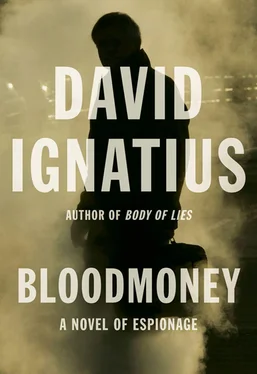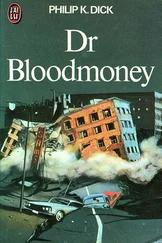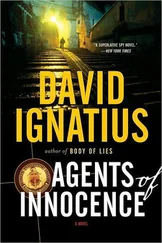David Ignatius - Bloodmoney
Здесь есть возможность читать онлайн «David Ignatius - Bloodmoney» весь текст электронной книги совершенно бесплатно (целиком полную версию без сокращений). В некоторых случаях можно слушать аудио, скачать через торрент в формате fb2 и присутствует краткое содержание. Жанр: Шпионский детектив, на английском языке. Описание произведения, (предисловие) а так же отзывы посетителей доступны на портале библиотеки ЛибКат.
- Название:Bloodmoney
- Автор:
- Жанр:
- Год:неизвестен
- ISBN:нет данных
- Рейтинг книги:4 / 5. Голосов: 1
-
Избранное:Добавить в избранное
- Отзывы:
-
Ваша оценка:
- 80
- 1
- 2
- 3
- 4
- 5
Bloodmoney: краткое содержание, описание и аннотация
Предлагаем к чтению аннотацию, описание, краткое содержание или предисловие (зависит от того, что написал сам автор книги «Bloodmoney»). Если вы не нашли необходимую информацию о книге — напишите в комментариях, мы постараемся отыскать её.
Bloodmoney — читать онлайн бесплатно полную книгу (весь текст) целиком
Ниже представлен текст книги, разбитый по страницам. Система сохранения места последней прочитанной страницы, позволяет с удобством читать онлайн бесплатно книгу «Bloodmoney», без необходимости каждый раз заново искать на чём Вы остановились. Поставьте закладку, и сможете в любой момент перейти на страницу, на которой закончили чтение.
Интервал:
Закладка:
Driving down Ventura Boulevard in the gray light before sunrise, Marx made a mental checklist of what she had to do that day. There was Egan. He didn’t like going to Pakistan, but nobody did anymore. She needed to remind him, straight up. This was why the operation in Los Angeles had come into existence: to allow deep-cover officers to go where they couldn’t go, and do what they couldn’t do. Of course Egan was nervous; that would keep him safe. She rehearsed the speech in her mind.
The light was turning yellow at Woodman Avenue. There was nobody around, but Marx slowed to a stop anyway. She was still thinking about Egan. She would have to hand him off soon to another case officer. He would be upset about that, too, probably. She would wait until he returned from Pakistan to tell him about her promotion. She had been named “chief of counterintelligence,” though it wasn’t clear what that meant in her little shop. There was no organization chart. Her boss, Jeffrey Gertz, was making it up as he went along. That was what Marx liked about the Los Angeles experiment. It was fresh. They got to make new mistakes.
The light was turning green. In the next lane was a red pickup on struts, with two stoners in the cab who had obviously been up all night drinking. The driver of the truck, an hombre in a turned-around Dodgers cap, was leering at her. Marx gunned the Escalade off the line and didn’t look back until she’d made it to Coldwater Canyon.
Marx parked her car in the basement and took the elevator up to the third floor, where she badged in with the overnight security guard. He gazed at her with heavy-lidded eyes; he still had a half hour left before his shift ended, but he looked cooked.
“Wake up, Chuck,” she said. “The sun’s coming up.”
She went to her small office and turned on the lights. On the wall was a framed poster from the movie Thelma and Louise, which showed Geena Davis and Susan Sarandon in their convertible, being chased by police cars as they were about to drive off a cliff. Above the image were the words: “Somebody said get a life…so they did.” On her shelf was a doll wearing sunglasses and a trench coat, with a tag that said “CIA Barbie,” which a friend had given her years before when she graduated from the Career Trainee class.
Marx used a Skype connection to call Howard Egan at the hedge fund in London that provided his cover. The name of the firm was Alphabet Capital, and it managed many billions of dollars, but Marx had never understood just how it worked: how much of it was real, and how much was a cover for intelligence operations. She had asked Egan once, and he had said not to worry: The only person who really knew was the owner of Alphabet Capital, a man named Thomas Perkins, and he wouldn’t talk if his pants were on fire.
Marx tried to sound enthusiastic as she went through her list of bullet points with Egan. He answered grumpily, giving brief responses to each. When she finished her script, there was a pause.
“I hate this trip,” Egan said. “It’s insecure.”
“It will be fine,” Marx answered. “Stop worrying. You are exactly what it says on your business card. So chill out: We have your back.”
Egan laughed at the attempt to dispel his anxiety.
“Great,” he said. “Now tell me, who has my front?”
He was talking himself into paralysis. Marx had seen it before with colleagues. Once you let yourself start to worry, the floodgates opened.
“Suck it up,” she said. “Call me when you’re out. Anything else, call the ops center. Are we cool?”
“We’re cold,” said Egan. “Freezing.”
“Out, here,” said Marx, as if she were ending a radio transmission. There was nothing more to say.
“Out,” responded Egan gloomily.
And that was it. She didn’t think about him the rest of the day. He would get through it somehow, because people always did. She thought about writing a note to Gertz, her boss, suggesting that it was time to reassign Egan to something a little less stressful. People began to arrive soon after, and Marx fell into the atonal melody of office life.
The sign out front of the building where Sophie Marx worked said that it was the headquarters of The Hit Parade LLP, a firm that according to its Dun amp; Bradstreet profile sold international music and television rights, negotiated licensing agreements and organized trade shows on the side. That explained the office in the Valley, big and roomy, but cheap, too. It explained the contacts with dozens of small firms and their peripatetic representatives, always flying off to strange locations. And it explained the constant stream of international calls and email messages.
“Hit Parade-we’ve got what’s hot.” That was the way Marx answered the phone, if anyone ever called her number at the office. The name made it sound like she worked with the Beach Boys and Sandra Dee. She had business cards, too, with a dummy switchboard number that never answered, which she sometimes gave to men in bars who were annoying.
Marx knew the short history of the place, the founding “myth,” you might say. Like so many other things about America, The Hit Parade was an aftershock of September 11, 2001. The CIA had been sent off to war, and then a few years later it had been sent to the stocks for a public bashing, when people decided they didn’t like the nasty parts of what the intelligence agencies had been asked to do. That left people at Headquarters feeling demoralized and unloved; agency veterans tried to stay out of trouble by doing the slow roll, which only made things worse. Eventually a new administration took office, and the potentates said, in effect, why are we torturing ourselves? Let the old CIA tramp steamer rust away at the dock, and meanwhile we’ll launch a stealthy new speedboat.
The White House had called it “new think,” as opposed to the witless “old think” that had come before. There was a mantra, among the handful of people who knew about the project: The world had changed; an intelligence service couldn’t operate out of embassies when it was trying to recruit people who wanted to blow up embassies. Technology enabled a new clandestine structure. A secure communications system, which used to require an embassy code room, could now be put on a laptop, or even a BlackBerry.
They told new staff members like Marx that the new president loved the idea. He wanted to be a change agent, so he had decided to change the most reviled three-letter acronym in town. The chairmen of the two congressional intelligence committees had signed on, and so had the handful of other people who were briefed on the idea. The few who knew about it accepted the absolute necessity that it be a secret and deniable activity. The old system was a train wreck, so they had created something truly new-floated it free from the wreckage and hid it where no one would ever think to look.
The president turned over liaison with this new organization to his chief of staff, Ted Yazdi, a combative former investment banker who loved secrets and, in another life, might have been an intelligence officer himself. Yazdi managed the operation out of the White House. He never put anything in writing; he never told anyone other than the president what he was doing.
Headquarters didn’t like it, but they couldn’t stop it. They proposed that the new unit focus on the dirty work the traditionalists didn’t much like, anyway-“special activities,” otherwise known as covert action. So in addition to the existing stations abroad, an array of new “platforms” was built for a cadre of nonofficial-cover officers and their laptops. The platforms had to connect up somewhere. The old boys wanted someplace close, like Fredericksburg or Rockville, where they could keep the great experiment from getting out of hand. But for once, the advocates of change had their way.
Читать дальшеИнтервал:
Закладка:
Похожие книги на «Bloodmoney»
Представляем Вашему вниманию похожие книги на «Bloodmoney» списком для выбора. Мы отобрали схожую по названию и смыслу литературу в надежде предоставить читателям больше вариантов отыскать новые, интересные, ещё непрочитанные произведения.
Обсуждение, отзывы о книге «Bloodmoney» и просто собственные мнения читателей. Оставьте ваши комментарии, напишите, что Вы думаете о произведении, его смысле или главных героях. Укажите что конкретно понравилось, а что нет, и почему Вы так считаете.












